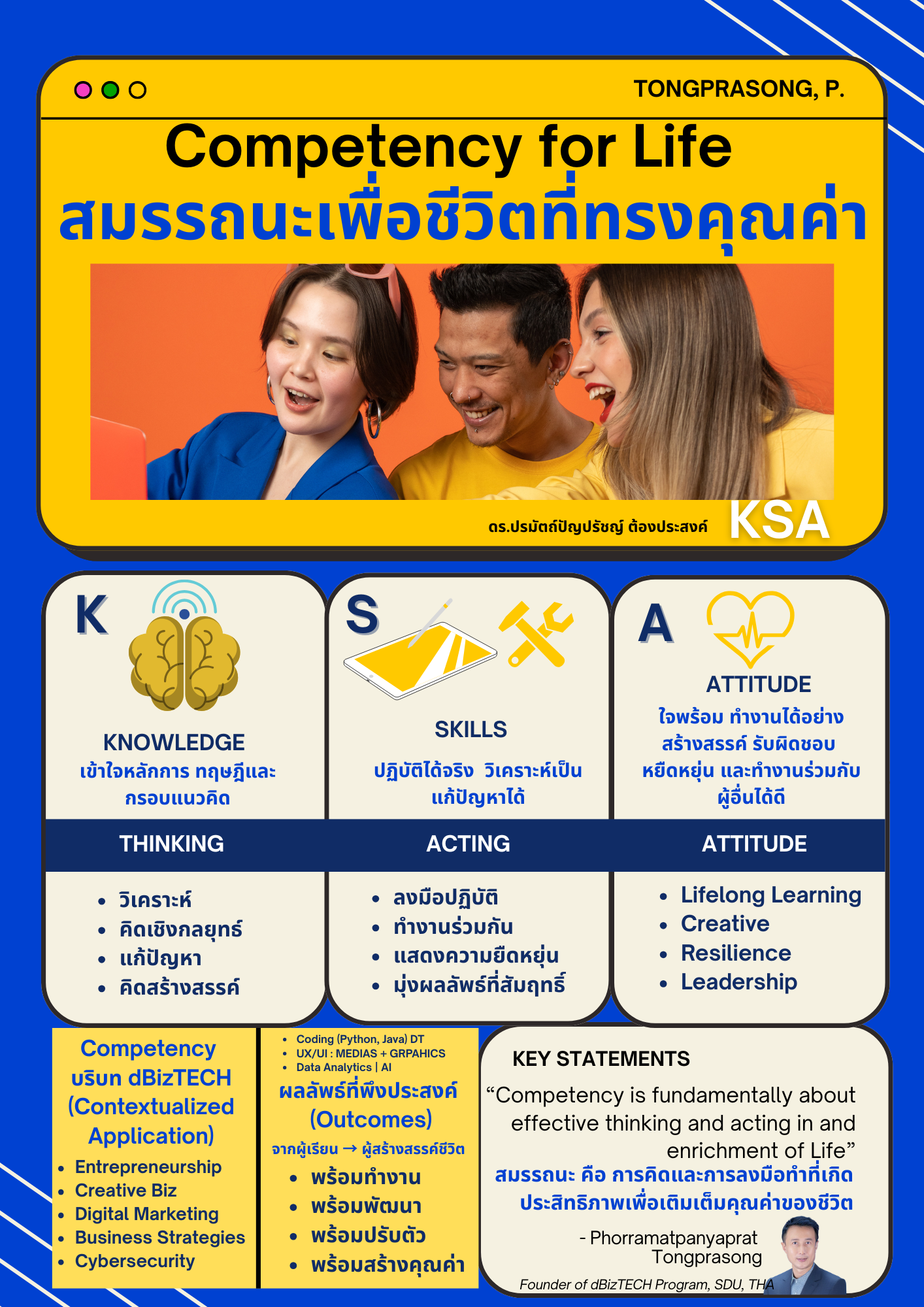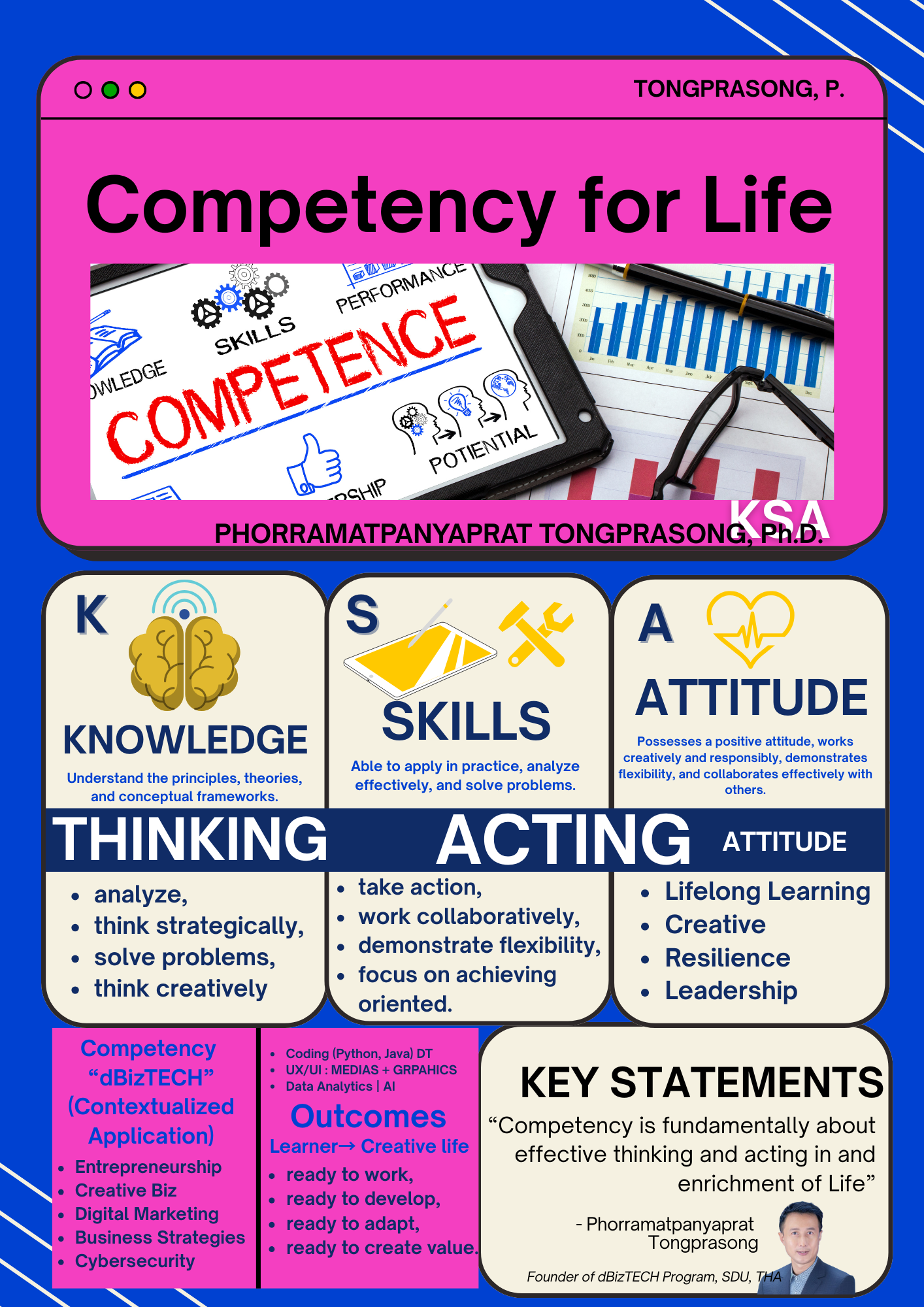
ASST.PROF. PHORRAMATPANYAPRAT TONGPRASONG, Ph.D., FHEA UKPSF
»ÃÁѵ¶ì»Ñ»ÃÑªì µéͧ»ÃÐʧ¤ì. (2567). ÃٻẺ¡ÒúÃÔËÒáÒþѲ¹Ò¡Ò÷ӧҹÁØ觼ÅÊÑÁÄ·¸ÔìÃèÇÁ¡Ñº¡Ò÷ӧҹÍÂèÒ§ÃÔàÃÔèÁÊÃéÒ§ÊÃäì¢Í§ÍÒ¨ÒÃÂìÁËÒÇÔ·ÂÒÅÑÂÃÒªÀѯ¡ÅØèÁÃѵ¹â¡ÊÔ¹·Ãì. ÇÔ·ÂÒ¹Ô¾¹¸ì ¡ÒÃÈÖ¡ÉÒ´Øɮպѳ±Ôµ ÁËÒÇÔ·ÂÒÅѾÐàÂÒ.
Tongprasong,
P. (2024). ADMISTRATIVE MODEL
DEVELOPING
ACHIEVEMENT ORIRENTED AND CREATIVE WORK OF THE RATANAKOSIN RAJABHAT
UNIVERSITY
INSTRUCTORS
[Doctoral dissertation, University of Phayao].
》》》》》》》》》》

Competency in terms of Dr. Phorramatpanyaprat Tongprasong’s Thesis and Beyond Professional Achievement Toward a Purposeful Life
[PDF]
Dr.Phorramatpanyaprat Tongprasong underscores the paramount importance of cultivating instructors’ competencies in both achievement-oriented work and creative initiative. This development is deemed crucial for driving the advancement of human resources, thereby shaping a high-quality populace for Thailand that is committed to lifelong learning. Furthermore, the program’s conceptualization of “competency” inherently integrates generic outcomes, such as “Thinking”—encompassing higher-order cognitive skills like critical thinking, problem-solving, creative thinking, and strategizing—and “Acting”—which incorporates practical skills (execution, application) alongside attitudes such as proactiveness, collaboration (team-building), and resilience. Moreover, the implicit inclusion of information technology skills, specifically pertaining to “digital technology” and “application development,” within this comprehensive definition ensures a direct alignment with the core competencies expected of modern graduates.
“Competency is fundamentally about effective thinking and acting in a given context.” (Tongprasong, P.)
- “Thinking”
encapsulates the knowledge
(understanding, analysis,
conceptualization) and higher-order cognitive skills
(critical
thinking, problem-solving, strategizing).
- “Acting”
encompasses
the practical
skills (execution, performance, application)
and the underlying attitudes
(proactiveness,
collaboration, resilience) that drive behavior and ensure effective
delivery of
results.
Meaning and Description of Competency
Definition:
Competency refers to a combination of knowledge, skills, and attitudes (KSA) that enables an individual to perform a task or job effectively and successfully in a given context. It’s not just about what a person knows, but how they apply that knowledge, what skills they possess, and what underlying personal attributes they bring to the situation. It's about demonstrated ability to achieve desired outcomes.
Description (Key Components):
Competencies are typically described through their three core components:
1.
Knowledge (Cognitive
Aspect):
-
This
is the theoretical
understanding, factual information, and conceptual framework an
individual
possesses. It’s the “what you know.”
-
Examples
in dBizTECH context:
Understanding of
digital marketing principles, knowledge of software development
methodologies,
grasp of data analytics concepts, theoretical understanding of business
strategies, familiarity with cybersecurity protocols.
2.
Skills
(Psychomotor/Behavioral Aspect):
-
These
are the
practical abilities, techniques, and proficiencies developed through
training,
practice, and experience. It’s the “how you do it.”
-
Examples
in dBizTECH context:
Coding in
Python/Java, designing user interfaces (UX/UI), analyzing large
datasets using
specific software, developing mobile applications, creating augmented
reality
content, performing project management tasks, effective communication,
critical
thinking, problem-solving.
3.
Attitude (Affective/Personal
Aspect):
-
This
encompasses the
individual’s mindset, values, beliefs, work ethic, and behavioral
traits that
influence how they apply their knowledge and skills. It’s the “your
approach to
it” or “your readiness to do it.”
-
Examples
in dBizTECH context:
Adaptability
to new technologies, willingness
to collaborate in teams, ethical conduct in handling data, proactivity
in
identifying solutions, resilience in facing challenges, leadership
qualities,
creativity, commitment to lifelong learning, customer-centric mindset.
- Knows what needs to be done (knowledge).
- Can do what needs to be done (skills).
- Is willing to do what needs to be done, and does it with the right mindset (attitude).
In
the cntext of the dBizTECH program, the focus on “Outcome-Based
Education (OBE)” and gathering feedback from “employers, graduate
users,
alumni, and experts” on “needs of stakeholders” strongly indicates that
the
program defines and teaches competencies as these integrated sets of
KSA,
aiming to produce graduates who are not just knowledgeable but truly
capable
and ready for the demands of the digital business and technology sector.
Contact:
Asst.Prof. Phorramatpanyaprat Tongprasong, Ph.D., FHEA
Suan Dusit University,
295 Nakhonratchasima RD., Dusit,
Dusit, BKK, Thailand 10300.
TEL. +6622445748
https://musterverse.dusit.ac.th/
phorramatpanypaprat_ton@dusit.ac.th
phorramatpanyaprat@gmail.com
》》》》》》》》》》
LINE OA @mustland
Since July, 2025
